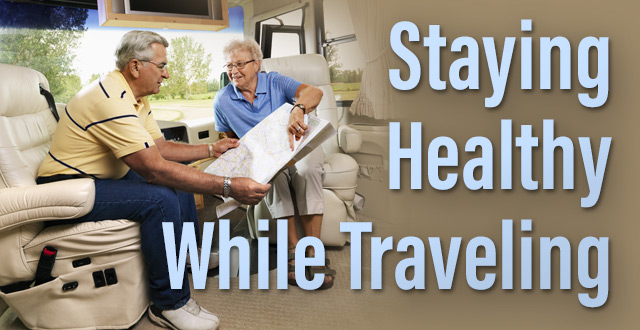There are many reasons to travel. Whether you’re seeing the grand-kids or simply visiting an exotic locale, travel offers a welcomed change of pace and a chance to have a fun adventure. Maintaining your health and safety is especially important if you’re traveling to a foreign country. Yes, travel is fun and exciting, but it’s not without a few health and safety issues to keep in mind.
See Your Doctor Before Traveling
This is particularly important if you have a preexisting medical condition. Your doctor will assess your current health status and determine your travel readiness. Some medical conditions can worsen during air travel and even before you land. Changes in air pressure and dry air can make respiratory problems even more pronounced. If you’ll be visiting countries prone to common communicable diseases, you may need to be updated on your vaccinations to help prevent infections.
Know Safety Precautions Prior To Traveling
In certain countries, it is not safe to drink the tap water and you must protect yourself from intestinal problems due to unclean water. In other countries, mosquitos that carry diseases like chikungunya and dengue fever are endemic. Be sure to follow travel and health and safety warnings before you go.
Create A Well-Planned Itinerary
Know what you can handle physically before you book your trip. If you have knee problems, leave climbing steep hills out of your trip. Don’t try to squeeze in too many activities if you know that you can’t handle it. Too many back to back tours and excursions can be tiring. Pace yourself. Add in extra time between activities. And don’t forget to get plenty of rest and add down time in your schedule.
Call Ahead
Make sure to contact your place of accommodation prior to travel, especially if you require specialized medical care. Diabetics may require adequate refrigeration for insulin. Or you may need a ramp or elevator access for a walker or wheelchair. Pack necessary medications and include an extra supply. You never know if your transportation could be delayed and you don’t want to run out of supplies.
Avoid DVT
Long flights and certain medications can make your blood more likely to clot. Deep vein thrombosis or DVT is a condition that causes blood to pool in the veins. Clots move through the bloodstream and end up in the lungs, creating a condition known as pulmonary embolism. The solution: move your legs and get your blood circulating. Get up every hour and walk around the plane. Use anti-embolism compression stockings.
Go Easy On The Margaritas
Alcohol and certain prescription and over the counter (OTC) medications can negatively interact with each other. Heart medications, antidepressants, and sleeping aids can have adverse effects when mixed with alcohol.
Notify Your Inner Circle
Let people know where you’re going and when you’ll return from vacation. Leave a primary contact number and an alternate in case your lines of communication become disrupted. When traveling internationally, leave a copy of your identification, passport, and other important information with family at home.
Take Care Of Your Mental Health
As enjoyable as travel can be, it can take a toll on your emotional health. It’s natural have bit of anxiety during travel. Jet lag can throw your body clock off. Try to keep your same sleep routine as much as possible. Meditate to soothing music. If you’re on group tour, seek solo time away to recharge.
Dodge Traveler’s Constipation
There are a host of reasons for traveler’s constipation such as lack of hydration, lack of exercise, and eating on the go. But, the biggest culprit is not keeping the same bathroom routine while traveling. Intestinal problems can also predispose you to constipation while traveling. The solutions are simple. Exercise and drink more non-caffeinated fluids. With your doctor’s clearance, consider taking a stool softener while traveling.
Get Travel Medical Insurance
Your home health insurance most likely won’t cover injuries that occur abroad and this can cost you thousands out of pocket. An accident can happen when you least expect it, making travelers insurance so important. If you have a preexisting condition or engage in risky activities while away from your home country, getting travel insurance is a must.
Keep these health and safety precautions in mind when travelling to make the most of your trip!

